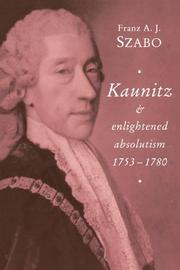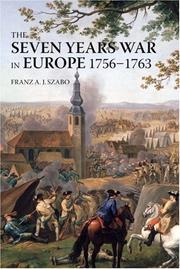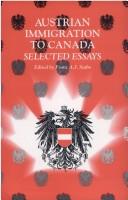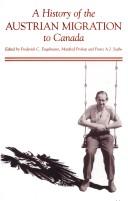| Listing 1 - 10 of 13 | << page >> |
Sort by
|

ISBN: 0521466903 0521451639 051188415X 0511523483 9780521451635 9780511523489 9780521466905 Year: 1994 Publisher: Cambridge: Cambridge university press,
Abstract | Keywords | Export | Availability | Bookmark
 Loading...
Loading...Choose an application
- Reference Manager
- EndNote
- RefWorks (Direct export to RefWorks)
This is the first major archivally based study of the political career of Wenzel Anton Kaunitz, State Chancellor of the Habsburg Monarchy from 1753 to 1792. Author of the diplomatic revolution of 1756 and brilliant foreign minister of the Austrian Empire, Kaunitz was also the most important statesman in the development of enlightened absolutism in central Europe. Virtually the third head of state under Maria Theresia and Joseph II, he was the driving force behind the many reforms which sought to modernise the monarchy. Using Kaunitz as a focus, the author explores the dynamic of the development of enlightened absolutism in the Habsburg Empire through its most influential proponent and spokesman. Enlightened absolutism in the Habsburg Monarchy produced some of the boldest innovations in eighteenth-century Europe, and this book analyses the full complexity of the decision-making process.
Kaunitz-Rietberg, Wenzel Anton, --- Austria --- Autriche --- History --- Politics and government --- Histoire --- Politique et gouvernement --- Maria Theresa, 1740-1780 --- 1740-1780 --- Kaunitz-Rietberg, Wenzel Anton, - Fèurst, - 1711-1794. --- Austria - History - Maria Theresa, 1740-1780. --- Austria - Politics and government - 1740-1780. --- Arts and Humanities --- Kaunitz-Rietberg, Wenzel Anton, - Fürst, - 1711-1794 --- Austria - History - Maria Theresa, 1740-1780 --- Austria - Politics and government - 1740-1780 --- Kaunitz, Wenzel Anton Dominik, --- Kounic-Rietberku, Václav Antonín z, --- Rietberg, Wenzel Anton Kaunitz-, --- Von Kaunitz-Rietberg, Wenzel Anton,

ISBN: 9780582292727 Year: 2008 Publisher: Harlow Pearson
Abstract | Keywords | Export | Availability | Bookmark
 Loading...
Loading...Choose an application
- Reference Manager
- EndNote
- RefWorks (Direct export to RefWorks)

ISBN: 0886292816 Year: 1996 Publisher: [Ottawa] : Carleton University Press,
Abstract | Keywords | Export | Availability | Bookmark
 Loading...
Loading...Choose an application
- Reference Manager
- EndNote
- RefWorks (Direct export to RefWorks)
Austrians --- Canadiens d'origine autrichienne --- History --- Histoire --- Austria --- Canada --- Autriche --- Emigration and immigration. --- Emigration and immigration --- Emigration et immigration
Book
ISBN: 9781845454333 1845454332 Year: 2008 Publisher: New York, N.Y. Berghahn
Abstract | Keywords | Export | Availability | Bookmark
 Loading...
Loading...Choose an application
- Reference Manager
- EndNote
- RefWorks (Direct export to RefWorks)
Environmental planning --- Architecture --- anno 1600-1699 --- Europe --- City planning --- Power (Social sciences) --- Architecture, Baroque --- Cities and towns, Renaissance. --- Sociology, Urban --- Urbanisme --- Pouvoir (Sciences sociales) --- Architecture baroque --- Villes de la Renaissance --- Sociologie urbaine --- History. --- History --- Histoire
Book
ISBN: 1282626914 9786612626913 0857450506 1845454332 Year: 2008 Publisher: New York : Berghahn Books,
Abstract | Keywords | Export | Availability | Bookmark
 Loading...
Loading...Choose an application
- Reference Manager
- EndNote
- RefWorks (Direct export to RefWorks)
The period of the baroque (late sixteenth to mid-eighteenth centuries) saw extensive reconfiguration of European cities and their public spaces. Yet, this transformation cannot be limited merely to signifying a style of art, architecture, and décor. Rather, the dynamism, emotionality, and potential for grandeur that were inherent in the baroque style developed in close interaction with the need and desire of post-Reformation Europeans to find visual expression for the new political, confessional, and societal realities. Highly illustrated, this volume examines these complex interrelationships
City planning --- Power (Social sciences) --- Architecture, Baroque --- Cities and towns, Renaissance. --- Sociology, Urban --- History.
Book
ISBN: 3900993432 9783900993436 Year: 1996 Publisher: Graz: Schnider,
Abstract | Keywords | Export | Availability | Bookmark
 Loading...
Loading...Choose an application
- Reference Manager
- EndNote
- RefWorks (Direct export to RefWorks)
Enlightenment --- Siècle des Lumières --- Congresses --- Congrès --- Kaunitz-Rietberg, Wenzel Anton, --- Austria --- Autriche --- Foreign relations --- Politics and government --- Relations extérieures --- Politique et gouvernement --- Congresses. --- Siècle des Lumières --- Congrès --- Relations extérieures --- Enlightenment - Europe - Congresses.

ISBN: 0886292832 Year: 1996 Publisher: [Ottawa] : Carleton University Press,
Abstract | Keywords | Export | Availability | Bookmark
 Loading...
Loading...Choose an application
- Reference Manager
- EndNote
- RefWorks (Direct export to RefWorks)
Austrian Canadians --- History --- Austria --- Canada --- Autriche --- Emigration and immigration. --- Emigration and immigration --- Emigration et immigration
Book
ISBN: 963962702X Year: 2005 Publisher: Budapest : Institute of History, Hungarian Academy of Sciences,
Abstract | Keywords | Export | Availability | Bookmark
 Loading...
Loading...Choose an application
- Reference Manager
- EndNote
- RefWorks (Direct export to RefWorks)
Joseph --- Austria --- History --- Civilization
Multi

ISBN: 9780857450500 Year: 2008 Publisher: New York; ; Oxford Berghahn Books
Abstract | Keywords | Export | Availability | Bookmark
 Loading...
Loading...Choose an application
- Reference Manager
- EndNote
- RefWorks (Direct export to RefWorks)
Book

ISBN: 085745109X 9780857451095 0857451081 9780857451088 9780857451088 Year: 2011 Publisher: New York Oxford
Abstract | Keywords | Export | Availability | Bookmark
 Loading...
Loading...Choose an application
- Reference Manager
- EndNote
- RefWorks (Direct export to RefWorks)
Early modern Central Europe was the continent's most decentralized region politically and its most diverse ethnically and culturally. With the onset of the Reformation, it also became Europe's most religiously divided territory and potentially its most explosive in terms of confessional conflict and war. Focusing on the Holy Roman Empire and the Polish-Lithuanian Commonwealth, this volume examines the tremendous challenge of managing confessional diversity in Central Europe between 1500 and 1800. Addressing issues of tolerance, intolerance, and ecumenism, each chapter explores a facet of the c
Religious tolerance --- Tolerance, Religious --- Toleration --- History. --- Europe, Central --- Central Europe --- Religion. --- Church history. --- 27 <063> --- 27 <4> "15/17" --- History --- Kerkgeschiedenis--Congressen --- Kerkgeschiedenis--Europa--Moderne Tijd --- Church history --- Religion
| Listing 1 - 10 of 13 | << page >> |
Sort by
|

 Search
Search Feedback
Feedback About UniCat
About UniCat  Help
Help News
News